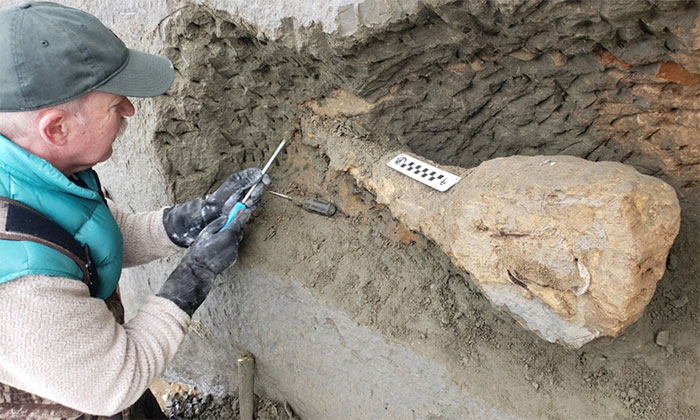Erosion cliffs reveal 15 million year old fossils
Scientists quickly unearthed two ancient dolphins to move to the museum when they were in danger of being damaged.
Ranger and paleontologists from the US National Parks Service (NPS) coordinate the excavation of dolphin fossils on coastal cliffs , near the Potomac River, Virginia, on March 16. In recent years, rangers have been regularly monitoring fossils exposed when cliffs erode rapidly. Some fossils that only saw a small portion last year were more exposed this year.

Stephen Godfrey studied the skull of the second dolphin.(Photo: NPS).
When examining the photographs, paleontologists Vincent Santucci, Justin Tweet (NPS Archaeological Program) and Stephen Godfrey (Calvert Sea Museum), identified fossilized bones of an ancient dolphin. Realizing that these important specimens were at risk of being damaged and swept away, they decided to quickly conduct the excavation.
The rapid response team consists of rangers and paleontologists heading to the coastal cliff to "rescue" the fossils. While working, they discovered the more complete skull of the second dolphin, not far from the first. The second specimen was also in danger of being damaged, so the team decided to excavate at the same time the first specimen.
Under Dr. Godfrey's instructions, the fossils were successfully extracted from the sedimentary layer."I am excited to be working with NPS and excavating the fossils of two 15 million year old dolphins , " Dr. Godfrey said.
"The first one consists of the backbone, ribs and part of the skull. The second one is an almost complete skull. It is mysteriously encased in hard sediments, which help preserve almost intact but also "The dolphin's skull has a particularly long nose, used to catch prey, such as fish," he explained.
After excavation, the expert team put the dolphin fossils on the ship. They will be transferred to Calvert Marine Museum for preservation and research. Scientists believe they belong to an extinct long-tailed dolphins family, once living near the Atlantic coast in the Middle East, a period that lasted from 22 to 8 million years ago.
- The oldest whale fossils ever discovered
- Discovering ancient whale fossils with strange shapes
- Fossil creatures 65 million years old
- Fossil animal feces reveal a secret ancient ecosystem
- Reveal shock from strange creatures 70 million years old: Earth rotates differently than the present
- The 390-million-year-old fossil has claws
- Detection of 67 million-year-old dinosaur fossils
- Very rare fossils of gibbons
- 114 million-year-old fossils reveal new 'super beasts'
- Discovering fossil fish fossils 152 million years
- Detection of 180 million year old sea monster fossils
- Discover cliffs with more than 5,000 ancient dinosaur footprints
- Germany: Detecting 3 million-year-old fossil remains red
- 185 million year fossils of ancient organisms have 38 children
 Discovered an ancient centipede fossil 99 million years old
Discovered an ancient centipede fossil 99 million years old Discovered bat-like dinosaurs in China
Discovered bat-like dinosaurs in China Discovered a 200-year-old bronze cannon of the coast
Discovered a 200-year-old bronze cannon of the coast Discover 305 million-year-old spider fossils
Discover 305 million-year-old spider fossils